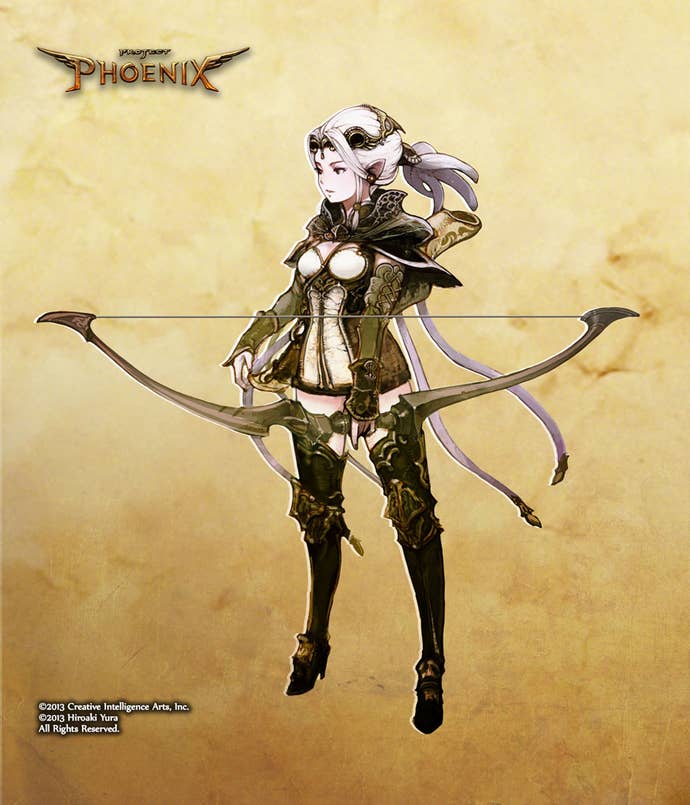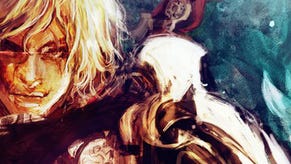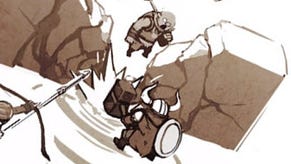Project Phoenix Focuses on Story, Not Graphics or DLC
Do you hate DLC? So does Project Phoenix director Hiroaki Yura. We chat about the Kickstarted rebirth of JRPGs.
This article first appeared on USgamer, a partner publication of VG247. Some content, such as this article, has been migrated to VG247 for posterity after USgamer's closure - but it has not been edited or further vetted by the VG247 team.
Earlier this week, a new Kickstarter drive offered backers an interesting proposition: be a part of creating a game that will "become a phoenix" and "forge a new direction for the Japanese games industry." Project Phoenix from Creative Intelligence Arts is a chance for fans to recapture a feeling that some believe has been gone from JRPGs for a long time. Prior to now, CIA was focused on musical endeavors, having recorded music for Soul Calibur V and Diablo III. The CIA team boasts some big names for its first full game, including famous Final Fantasy composer Nobuo Uematsu, L.A. Noire game designer Vaughan Smith, and Grammy-winning music recording engineer John Kurlander. CIA is led by Eminence Orchestra founder and violinist Hiroaki Yura, who is the director and producer for Project Phoenix.
After a few emails with CIA PR, I find myself in a Skype conversation with Yura about where Project Phoenix is coming from and what the team hopes to accomplish. Yura's a soft-spoken, measured gentleman whose Japanese heritage and Australian origin means I get a taste of both accents during our talk. I kick off the conversation with a simple question: if Project Phoenix is the rebirth of the JRPG, when did it die?
"I don't think it's dead. I just feel it's not what it used to be," Yura replies. "I think JRPGs used to be about story; they affected the player quite a lot emotionally. They had the function of a musical. You get to see a grand story played out right in front of you, but you also get the reward of being able to play and feel as if you're really there. I think that's what JRPGs are all about. When did it die? I don't think it's dead, but I think it's lost its way somewhat these days."
Yura tells me that Final Fantasy IX was the last time a game in Square Enix's leading JRPG series actually moved him. Although that game was released over a decade ago, Yura still remembers it as "fantastic." I ask him if Final Fantasy's heyday inspires Project Phoenix's style.
"JRPGs are really about the story. It's not really about the combat."
"We've got so many inspirations, but there's so much of our own stuff here," he answers. "I can't really give you one or two games. I love Blizzard games. I love the way Squaresoft and Square Enix told their stories."
Project Phoenix sells itself as an JRPG, which for many fans in the turn-based combat found in Final Fantasy. But since Hironobu Sakaguchi launched Final Fantasy back in 1987, the scope of the JRPG has been changed. This week saw the release of Namco Bandai's Tales of Xillia in North America; the game features a real-time combat system with a helping hand from some artificial intelligence. I ask Yura if he feels that not having turn-based combat may turn off a few fans.
"As I said, JRPGs are really about the story. It's not really about the combat. The combat system always changes. It's not just about turn-based combat, it's real-time as well," he insists, before diving into a description of Project Phoenix's combat system.
"Have you played Starcraft and Warcraft?" he asks me. "You know those team missions where you don't have Barracks? You can't make new units, peons, or farmers? You do missions in small teams. [Project Phoenix] is basically that. That's the closest description I have for you; it's that and a little bit more."
Yura describes Project Phoenix's combat as "squad-based," and he tells me that CIA is trying to move away from useless micromanagement. The team wants players to feel like they're controlling heroes.
"These heroes that you control are heroes, they know what to do," he explains. "It's like you're controlling the Fellowship from Lord of the Rings. They know what to do, they're professionals. Whereas in Starcraft, you've to tell them what to do each bloody time. It's really annoying because they're supposed to be trained marines, but you need to tell them to get into range, when to throw a grenade, it just gets annoying. It's micromanagement."

Will players have the option to micromanage their characters if they want to? Yura tells me "no," but his answer came after some thought, so the idea may still be in flux. The game's story is built around a group of core characters created by CIA, but at points in the game, players will have the option of creating and customizing their own squad members. It straddles the line between a set list of cast members like Fire Emblem: Awakening and a fully-customizable squad like XCOM: Enemy Unknown.
"The combat is very fast-paced," Yura says with clear excitement in his voice. "It's going to look fantastic, it's going to have lovely animations. That's the type of combat we want. The only way you're going to die, is when you get cornered with large amount of enemies and surrounded. It's like 300: King Leonidas and his 299 Spartans would fight in an enclosed space so they'd have a tactical advantage. It's all about how you use your team and split your squads. The squads can help each other out. It's about how you gear your characters."
"I hate DLC. I believe in giving a full game that people can explore.
When asked about the type of overworld fans can expect, Yura points out the Kickstarter drive's $1.025 million stretch goal for a full overworld. If that goal is not reached, he says that the game's overworld will resemble Tactics Ogre: a full detailed world map with specific points for players to move back and forth between.
I've personally found that JRPGs endings tend to be more metaphysical than their Western counterparts. I ask Yura if he feels the same way. What kind of ending will Project Phoenix have?
"I really don't like some JRPG endings," he says. "I think Secret of Mana or Legend of Zelda ended well. I think we're going to aim for that kind of ending, instead of an open-ended, 'if this game sells, then we're going make a sequel to milk more money out of you.' We are thinking of sequel, but it's not because we think we'll have another successful Kickstarter. We want to continue on with the story because there's more story to be told."
Does that mean there's no downloadable content for Project Phoenix?
"I hate DLC," Yura replies, his angry tone backing up his words. "I believe in giving a full game that people can explore. There might even be extra stuff like the cow level from Diablo, things like that. My staff is saying that I need to change my thinking towards DLC, because people don't think like this anymore, but I really feel that when people buy a game they get the full game and more. Saying 'oh, we have an extra skin or an extra storyline which is very short, but we want money for it,' I think that's really not right. It doesn't sit well with me."

The conversation turns to the Kickstarter drive itself. Project Phoenix cleared its Kickstarter goal of $100,000 after the first day and it currently has over 7,000 backers as of this writing. That's a far cry from Project Eternity's 73,986 backers, but it's a damn good start for the first week. Project Phoenix's original $100,000 goal was only to cover 3D modeling; the rest of the team is working on the game salary-free with the promise of royalties in the end.
"It's fantastic. We're very overwhelmed by the support that we're getting and we really want to hit the next stretch goal. I don't know how many stretch goals we can hit, but I do have plans up to $4.7 million," he says before I stop him for clarification.
The Kickstarter itself only lists stretch goals up to $1.65 million. Where's the rest?
"We don't want to be full of ourselves just yet," he chuckles. "Not that I think we'll hit that, but it will be nice if we do."
One problem Project Phoenix has already run into is the announcement of an online DRM system. In the Kickstarter's first update, the team detailed the game's implementation of DRM. Connecting to online servers will allow backers to claim their Kickstarter rewards, use online profiles, gain achievements, access cloud saves, and download updates. The game is still completely playable offline, but will require an activation key at installation. Project Phoenix's online services - outside of the multiplayer stretch goal - will be accessible after the first online connection; if there's an outage or dropped connection, the game will just sync up when the internet finally returns.
Some fans didn't like any hint of online DRM. I ask Yura if he or his team expected the pushback they received to the idea.
"No. We did explain the online-DRM, but at the same time we explained about the version where you don't need to go online at all. You don't need to activate it online, you just need to put in a code and that's it. The pushback... we think it's a vocal minority, but we do care about them," he says. "I was very surprised that they were very vocal about how they hated the activation code. I've lived with activation codes and I think it's fair to put in eight digits so that we can protect our IP."
"At the same time, I know that this is going to get cracked anyways," he continues. "I think it's reasonable for us to ask that you need to activate it. If you want your Kickstarter backer items, then you're asked to login to our servers to retrieve it. Our backers are giving good money for something that's valuable. You don't want some hackers just hacking into the game and devaluing what you guys bought. It's just not fair. In order for me to be responsible with how that's handled, the only way I can think of right now is for people to login with their own account. We can verify that it's them and give them what they deserve."

I ask about the idea of the angry backers being a vocal minority, and Yura tells me the team hasn't had very many declining backers since the announcement.
"I've seen one or two dozen people out of the 6,000 backers that we have right now either decreased their pledge or cancelled altogether," he tells me.
What about handling all that money? Double Fine was the first major game developer success on Kickstarter, but the studio recently announced that the Double Fine Adventure - now called Broken Age - would need to jump to Steam Early Access and be split into two episodes. Double Fine's Tim Schafer explained that his team's vision for the title grew once the Kickstarter went way beyond expectations. Under the new vision, the game wouldn't be ready until 2015 and content would need to be cut.
How does CIA expect to prevent itself from running into the same problems?
"To be honest we might be late, but in terms of scope: [it's not a problem] at all, because we know what we're going to make," says Yura. "It's just basically upping the quality of our game. The horizontal aspect or the essence of the game, it's already there. For example, music. We're going to have a synthesized orchestra currently, because we can't afford the orchestra. But when people give us more money, then we just put that into that music. It's the same with models. We have several models that we need, but if people give us more money, then we get more variation in models and more armor. We can design more. It doesn't take us that much time to do that, but it does take money." Needing more money also extends to the multiplayer stretch goal. Yura believes that multiplayer is a natural fit for the game, but the stretch goal is so high because CIA would need to hire a separate multiplayer team. Yura does not think CIA will reach the multiplayer stretch goal as it's "very, very high up there."
Project Phoenix is being developed in Unity and is currently coming to PC, iOS, and Android. The Kickstarter mentions possible PlayStation 4 and PlayStation Vita versions, but negotiations are still ongoing. Yura says that all versions will come at the same time.
"If we are doing doing the PlayStation 4 and Vita, everything is going to be launched simultaneously," he tells me. "We hate people giving away stories or writing spoilers on Facebook. Worldwide on all regions and systems. We are planning an English and Japanese release."
Since the Project Phoenix team is working on the game in their off-time, some of the team members can't be announced. I asked Yura when we could expect to find out who the unnamed members are.
"The lead programmer will be sometime halfway through development, because he has contracts that he has to honor. The [Art Supervisor] is going to be announced right before the actual release of the game, because... yeah..." he says, laughing nervously. "It's just the way Japanese studios work. He just can't be announced right now."
We don't think it's about the graphics, it's about the gameplay and how you tell the story. They're concentrating on how pretty it's going to look. We're not after the same thing.
Wrapping up our conversation, I bring the talk back to Final Fantasy. Final Fantasy Versus XIII, years after its original announcement, has changed platforms and names. The new Final Fantasy XV is coming for PlayStation 4 and Xbox One, but it has no concrete release date. I ask Yura if he's worried about Project Phoenix going up against Final Fantasy XV.
"We don't really care," he replies. "What we're doing and what they're doing is totally different. We don't think it's about the graphics, it's about the gameplay and how you tell the story. They're concentrating on how pretty it's going to look. We're not after the same thing."
Is he even looking forward to Final Fantasy XV?
"Not really," he says. "I like the world of Final Fantasy XIV, but unfortunately I don't really have time for another MMO."








